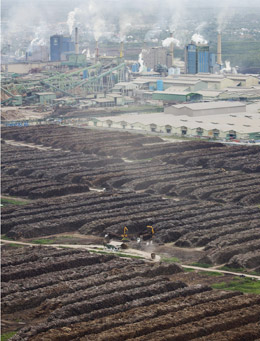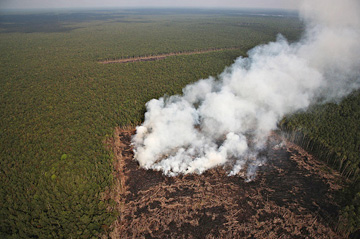Asia Pulp & Paper’s widely heralded forest conservation policy came after the forestry giant had already cleared nearly all of the legally protected forests within its concessions in Sumatra, alleges a new report published by Greenomics, an Indonesian environmental group.
The report, published Monday, is based on analysis of Ministry of Forestry data and satellite imagery for ten APP companies in Riau, Jambi and South Sumatra on the island of Sumatra. It finds that the forest policy announced by APP in February protects very little forest other than what is legally off-limits under Indonesian forestry regulations.
“We have strong grounds for concluding that there is no natural forest or forested peatland of meaningful extent that has been saved by the New APP Forest Conservation Policy in the concessions of APP’s suppliers that have been allocated for the development of pulpwood plantations in Sumatra.”
Greenomics says satellite data indicate that surviving natural forest and peatland within concessions that supply APP consist of areas that are either inaccessible, affected by conflict with communities, legally designated protection zones, or areas that can’t be exploited, such as an area of deep peat that was later re-zoned with Ministry of Forestry approval.

Greenomics argues that the findings suggest that APP waited until after it had cleared as much forest as possible before establishing its forest conservation policy, which limits conversion of high carbon lands, high conservation value forest, and conflict zones.
 Wood is stacked up outside APP’s mill in Riau Province, Sumatra, one of the world’s largest pulp mills. Photo by Daniel Beltra / Greenpeace |
“It would appear that commitment to the New APP Forest Conservation Policy was delayed until the clearance of natural forest and forested peatland for the development of pulpwood plantations had been completed,” stated the report. “The natural forest fiber resulting from such clearances has come in very useful as a source of raw material for APP operations, particularly for 2013.”
The report only evaluated APP’s concessions on the island of Sumatra. Preliminary research suggests the policy will indeed protect significant blocks of forest and peatlands on the island of Borneo, where APP developing new plantations. APP’s policy, which went into effect February 1, 2013, applies to all new plantation development and all of its suppliers.
The policy was brokered by The Forest Trust (TFT), a non-profit consultancy that helps companies reduce the environmental impact of their operations. TFT will be responsible for monitoring APP’s compliance with the policy.
The policy is ambitious enough that one of APP’s most vocal critics and agitators, Greenpeace, will suspend its highly-damaging campaign against the paper giant. The campaign against APP has cost the paper giant tens of millions of dollars in lost business since 2009.
The policy, should it hold, would mark a shocking reversal for APP, which has been depicted by a number of groups as one of the world’s biggest environmental pariahs. According to Eyes on the Forest, a coalition of Indonesian environmental groups, APP’s fiber suppliers destroyed 2 million hectares of forest in Sumatra since 1984, including 675,000 ha of “critically endangered” and “endangered” forest, 550,000 ha of tiger habitat, 240,000 ha of elephant habitat, and 1,500 ha of orangutan habitat. The allegations led scores of companies to drop APP as a supplier.
 Smoke from man made forest fires in the RAPP concession — a subsidiary of APRIL — in Giam Siak Kecil area to clear land for palm oil plantations. With APP’s policy in place, some activists have now turned their attention to APRIL, Indonesia’s second-largest pulp and paper company. APRIL still has large blocks of forest within its concessions. © Greenpeace / John Novis. |
At the time of the announcement APP Chairman Teguh Ganda Wijaya said it made the move for “the sustainability of our business”.
“APP is a world leader in the pulp and paper business, and we will act as leaders are expected to do.”
In response to the Greenomics report, APP said it is still working to assess to conservation impact of the forest policy.
“Between our APP team, TFT and HCV assessors, we have over 200 people working on the ground right now,” Aida Greenbury, APP Managing Director for Sustainability, told mongabay.com. “They are tasked with mapping natural forest boundaries and the complex process of HCS and HCV evaluations.”
“Our initial satellite image analysis on the 15 concessions which were converting natural forests prior to February 1st 2013, shows that, as a result of our Forest Conservation Policy, there are substantial natural forest areas left protected throughout Sumatra and West Kalimantan. We will continue to report our progress as each element of our program is completed.”
Greenbury added that initial analysis from TFT suggests the amount of forest which will be protected as a result of the new policy is between 150,000 and 250,000 hectares across the two islands.
- CITATION: Greenomics-Indonesia: APP’s artful deception March 18, 2013.